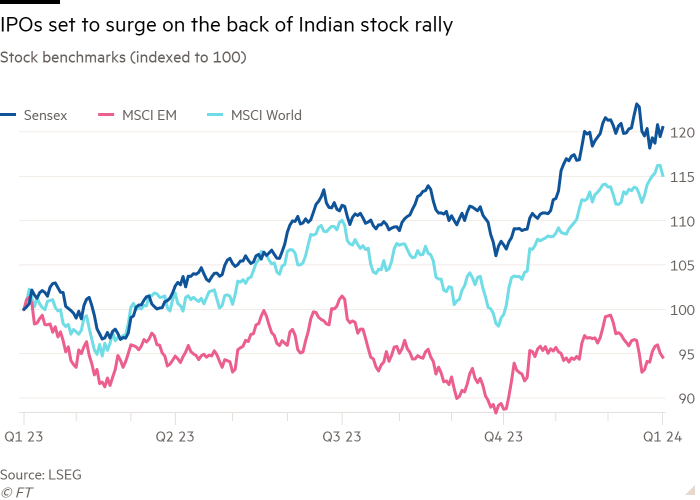Stay informed with free updates
Simply sign up to the Indian business & finance myFT Digest — delivered directly to your inbox.
India’s surging stock market is fuelling a rush of initial public offerings, but some investors are becoming worried about the poor performance of many of Mumbai’s listings.
Investors and analysts said the upbeat outlook for India’s economic growth, improved corporate earnings and strong demand from foreign investors are providing a tailwind for deals, with Dealogic data showing 21 IPOs raised about $678mn in January, compared with $17mn a year ago.
More listings are expected: a total of 66 companies have filed listing documents with Indian regulators, according to brokerage IIFL.
But analysts warn that a 20 per cent rise in India’s benchmark Sensex stock index over the past 12 months has pushed valuations for the country’s equities to historically elevated levels.
“In the near term, strong IPO flows look set to continue in India,” said Kunal Vora, head of India equity research at BNP Paribas, pointing to strong fundamentals and growth estimates for the coming year. “The only concern that remains is that of valuation.”
The slate of anticipated deals includes Ola Electric — expected to be among the largest Indian IPOs of the past two years — as well as fintech group MobiKwik.
India’s IPO market picked up last year as stocks, which had made little progress since late 2021, rallied on the back of strong corporate earnings and growing enthusiasm from both domestic and international investors. Many of the foreign investors were hunting for attractive growth opportunities after fleeing China’s tumbling markets.

That renewed enthusiasm helped push the total market capitalisation of stocks listed in India to roughly $4tn, overtaking Hong Kong to become the world’s seventh-largest market. Last year, Indian IPOs raised almost $8bn.
“The potential for Indian companies to go public and raise capital is huge and still under-tapped,” said Nirmal Jain, IIFL’s founder. While “the older generation [of company founders] was very conservative and wanted to keep information private . . . a new generation has come”.
India has become one of the fastest-growing economies in the world, with an expansion of 7 per cent expected this year.
It has been a leading beneficiary of unease over China’s economy and geopolitical tensions with the west, with foreign investors pouring more than $20bn into Indian stocks compared with $8bn into Chinese equities in 2023, according to Société Générale.
The country’s large listed companies have benefited from Prime Minister Narendra Modi’s emphasis on infrastructure and digitisation, with the government on Thursday announcing an increase in public spending in a budget ahead of elections this year.
The digitisation drive has helped attract millions of new retail investors to India, with the total number of trading accounts in the country rising to a record of nearly 140mn by the end of 2023.
SocGen’s analysts warned, however, that with Indian equities far more richly valued than their Chinese counterparts, the “relative strength argument is somewhat weakening”.
An analysis of returns on debut share sales in Mumbai during recent years also highlights the poor performance of many Indian IPOs, which could mean that domestic and global investors eventually lose their appetite for such listings.
Demand for IPO shares in companies that have listed in India since the start of 2021 has outstripped available supply by 44 times on average, with those stocks going on to jump about a quarter on the first day of trading, according to a recent report by investment firm YK2 Partners.
But two-thirds of those listings went on to lag behind the broader market, according to the firm, which said Indian IPOs “might make sense for investors looking for an IPO pop but not for long-term investors”.
Among the most prominent examples is Paytm — one of the first of a generation of technology start-ups to go public in 2021, which is now trading at Rs609 a share, about 70 per cent below its IPO price.
Paytm’s shares fell sharply on Thursday after the Reserve Bank of India ordered its payments bank to stop taking deposits and offering banking services, cutting off a vital growth area for the fintech group. The RBI cited “persistent non-compliances and . . . supervisory concerns”. The company has said it is complying with the order.
Concerns about IPO performance have prompted some institutional investors in India to question the wisdom of participating in new listings. Raamdeo Agrawal, chair of Indian financial group Motilal Oswal, said his mutual funds would largely eschew IPOs this year, preferring capital raises from companies already trading on public markets due to the greater transparency around their finances.
“IPOs, for serious buying, are avoidable,” he said. “People apply into an IPO and hope for a big pop . . . We’re in the game of investing, we’re not in the game of speculating.”
Read More: World News | Entertainment News | Celeb News
FT








